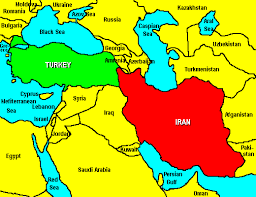The P-5+1 group will reconvene in Geneva on Wednesday to try again to hammer out a framework for Iran to limit its nuclear activity in exchange for some economic relief. The stream of leaks and tweets to come will alternate between signs of breakthrough and collapse as each side tries to play to their domestic audiences and shape the negotiation. Regardless of whether this particular round produces an agreement, there are several countries with a stake in these negotiations that are not going to wait around for a public announcement. They already feel the regional balance of power shifting beneath them and are not wasting time positioning themselves for the challenges and, for some, the opportunities to come.

Turkey is one such country. Its foreign policy team has been in overdrive since the first round of Geneva talks took place in October. Turkish Foreign Minister Ahmet Davutoglu started off this month hosting Iranian Foreign Minister Javad Zarif in Ankara. Davutoglu then went to Baghdad on Nov. 7-9 to meet with Iraqi Prime Minister Nouri al-Maliki. Following a statement from Davutoglu in a closed parliament session that hinted at Turkey's restarting its efforts to normalize relations with Armenia, Turkish Prime Minister Recep Tayyip Erdogan and President Abdullah Gul met with their counterparts from Azerbaijan in Ankara on Nov. 12-13. Earlier this week, Davutoglu concluded meetings in Washington on Nov. 18 and will meet with Erdogan in St. Petersburg, Russia, for talks with Russian President Vladimir Putin and Foreign Minister Sergei Lavrov on Nov. 21 before heading to Iran the following week.
What prompted Turkey's busy schedule was the developing U.S.-Iranian dialogue. To set the tone for his Washington visit, Davutoglu wrote an editorial published by Foreign Policy magazine Nov. 19. The article stressed the shared values and importance of a U.S.-Turkish strategic partnership to respond to what he called "an increasingly chaotic geopolitical environment." Davutoglu expressed his support for the U.S.-Iran dialogue, conveying the message that Turkey is not going to resist the direction of U.S. policy in the region. That said, there are some issues that Ankara will want to bargain with Washington in return for its support for a U.S.-Iran settlement.
Turkey is nervous about the prospect of Iran and its allies strengthening their position in the region. Ankara already burned bridges with the Syrian regime through its support for Syrian rebels and is on shaky ground with Baghdad over a controversial pipeline being built between Turkey and Iraqi Kurdistan against Baghdad's will. But Turkey is also too constrained internally and externally at the moment to compete effectively with Iran in the current environment, particularly in a conflict as explosive as Syria.
The one area where Turkey is trying to maintain some leverage is in Iraqi Kurdistan, where Ankara wants Washington to ignore the completion of a pipeline that would enable Iraq's Kurdish region to circumvent Baghdad in exporting its oil to Turkey. Turkey does not just want the oil; it also wants a secure political and economic foothold in Iraqi Kurdistan that will translate into Kurdish votes in upcoming elections at home. Washington, however, is not in the mood to undermine Iran's ally in Baghdad or undermine Iraqi central authority over an already deeply fractious country. So far, it is unclear whether Turkey will be able to convince Washington to allow Ankara to fulfill its Kurdish objective.
Another area where Turkey is trying to improve its position -- and is looking for American support -- is in the Caucasus. Turkey already has a close relationship with Azerbaijan, but it is reviving discussions to reopen a railway with long-standing adversary Armenia that could eventually help normalize relations. Turkey is meanwhile trying to put pressure on the United States to play an active role in reviving and mediating negotiations over Nagorno-Karabakh, an Armenian-supported secessionist region that belonged to Azerbaijan before 1994.
There is a Turkish logic to these recent diplomatic efforts. A Turkish-Armenian rapprochement would allow Ankara to deepen its foothold in the Caucasus and thus compete more effectively with Russia and Iran in the region. Russia already has extensive influence in Armenia, Georgia and Azerbaijan, and Iran stands to improve its position in the region in the future. Turkey knows it needs to act quickly if it wants to exploit the U.S.-Iranian negotiating environment to facilitate a Turkish-Armenian rapprochement.
Turkey will not be able to make any progress with Armenia unless it can ensure first that Azerbaijan's demands over Nagorno-Karabakh are met, and it is on this issue that it needs the United States to play an active mediating role. Notably, the United States and Russia, both members of the Organization for Security and Cooperation in Europe's Minsk Group that mediates this conflict, oversaw negotiations between the Azerbaijani and Armenian leaders Nov. 19 after nearly two years of stalemate. After meeting with Davutoglu, U.S. Secretary of State John Kerry spoke with the Azerbaijani and Armenian leaders and said he would urge the negotiation forward. This is what Turkey wants to hear, but Ankara will still have reason to doubt the level of U.S. commitment to this issue.
In the same way that the United States does not wish to provoke Iran by supporting a Turkish project in Iraq against Baghdad's will, the United States does not necessarily want to open another confrontation with Russia in the Caucasus while at the same time trying to preserve its negotiation with Iran. Despite its rhetoric expressing support for a settlement, Moscow is perfectly content with the status quo in the Caucasus and does not want to see a legitimate resolution to Nagorno-Karabakh that would open more doors for Turkey in the region.
Turkey is trying to make the best of the shifting environment. But ultimately, it may still be outvoted by the United States, Iran and Russia on the issues it cares about most.
sourche: stratfor
Δεν υπάρχουν σχόλια:
Δημοσίευση σχολίου